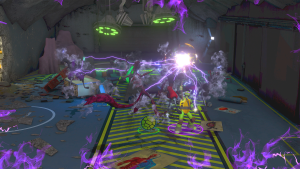Please support Game Informer. Print magazine subscriptions are less than $2 per issue
Salem

Salem begs the Minecraft comparison. Its world is not a fully 3D set of blocks like Mojang’s runaway hit, but it invokes a similar sense of taming a wild world and remaking it in your own image. Instead of allowing players to build ridiculous contraptions, Salem presents a crafting system so deep that when you bake a pie, it’s a serious accomplishment. Oh, and it’s a fully public, non-instanced MMO with no NPC towns or rules about where you can go or who you can steal from or even murder, just whatever civilization players make for themselves. You can’t tell me I didn’t just pique your interest.
Building a house in Salem is a far more complicated affair than slapping some blocks together and calling it a day. You need nails – do you have iron? A blacksmithery? How about a sawmill to turn raw wood into planks? Even once you have all those things, time is a big factor. The sawmill takes time to process raw lumber, for one thing.
Time takes on an even more important role when you look at farming or baking or turning clay into bricks. Leave your crops in the ground too long, and they’ll rot where they stand. Forget to take your bricks out of the kiln and they’ll burn to ash. Salem does not hold your hand whatsoever.
Salem enforces very few laws in the game’s code itself. Anyone can smack anyone else around, steal their stuff, or even kill them. Commit a crime, though, and you’ll leave behind a clue. If another player finds that clue, they’ll be able to track you wherever you go in the world. If the offense is serious enough – stealing valuable items, or murder – they’ll be able to summon your avatar into the world, even if you’re offline, and enact whatever justice they see fit. Since players can create a descendant of a slain character, who inherits certain things from his or her fallen forebear, you better make sure you know what you’re doing when you decide to mess with a fellow player as they’ll more than likely come back after you.
Salem doesn’t have a day/night cycle, but the light level of an area depends on the level of civilization there. Cobblestoned roads, houses, farms, and the like raise the level of civilization and therefore the lighting, so your homestead or town should be a relatively cheery place to hang out. Out in the woods, though, the blackest night shrouds the land in mystery. Creatures out of 16th century folklore haunt the dark forest, ready to prey on anyone brave enough to venture out. The only way to stake a claim to land of your own or find new resource deposits is to step out into the world, though, and those very monsters drop unique resources that will no doubt be in great demand.
Salem is very, very early in development. The game looks and plays rough (the image above is promotional art, not in-game graphics), and huge sections of the design have yet to be implemented. It’s not a high production value game that will wow you with spectacle or lure you in with spotless polish. Still, it’s a unique mishmash of oldschool wild-west Ultima Online, Minecraft, and Animal Crossing that has mind-bending potential. Paradox and developer Seatribe expect to slowly ramp up a closed beta starting in early 2012 as they approach a full release in the summer.











